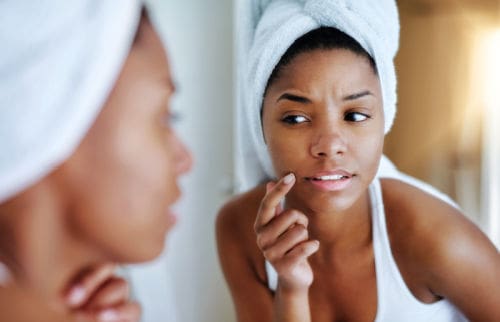
But it’s for a good reason: certain ingredients can be absorbed into your body, and therefore, your baby’s body, too. For example, some face washes, body lotions, skin care products, and makeup has ingredients that have been proven to pose a threat to a developing fetus.
You can rest assured that most over-the-counter (OTC) body products are totally safe, but there are a few key ingredients that could be harmful to your growing baby. However, it can be difficult to find out exactly which ingredients you should avoid during pregnancy. For example, can you use salicylic acid? What about benzoyl peroxide? And what’s the deal with that hyaluronic acid that’s been so popular lately? The good news is that you can find a balance between maintaining your pregnancy glow and shielding your baby.
That’s why Pregnancy Help Online is launching a blog series all about pregnancy-safe beauty products. We’ll go over the safest beauty products to use during pregnancy, including sunscreen, shampoo, cosmetics, and skincare products. We’ll start today by listing skincare ingredients you should avoid during pregnancy. In the next installment of our series on pregnancy-safe beauty products, we’ll share links to the best pregnancy-safe skincare products.
Whether you’re looking for a pregnancy-safe product to remedy an unwelcome skin change or you’re checking up on the safety of your current routine, this breakdown of the specific ingredients to avoid is for you.
Ingredients to Avoid During Pregnancy – and a Few Alternatives
So before we get started, we must point out that’s limited evidence-based data on the safety of specific products in pregnancy. But studies on animals have shown a few common skincare ingredients have serious effects on a fetus, so we’ve based our recommendations on these.
Currently, cosmetic products don’t need FDA approval to be sold on the market. So most experts will err on the side of caution about pregnancy-safe skincare products. When in doubt, discuss with your physician.
Avoid: Retinoids
Some anti-aging skincare products use retinoids, which have become a holy grail because they have been proven to reduce fine lines AND help reverse acne. Retinoids do this by boosting collagen production to rejuvenate skin and helping surface-level skin cells exfoliate more quickly.
Products you can buy over-the-counter have lower levels of retinoids, but prescription medications like Retin-A and Accutane contain much higher doses. The amount of retinoids you absorb from topical products is probably low, but experts have linked birth defects with higher doses of retinoids. So, experts advise against using retinoids during pregnancy.
Prescription retinoids like Accutane have been shown in studies to pose a 20 to 35% risk of severe congenital disabilities, with up to 60% of children having neurocognitive problems with exposure in utero.
What to Use Instead of Retinoids
If you’re breakout-prone, there are some safer alternatives to retinoid-based products when you’re pregnant. One of the most effective alternatives is glycolic acid.
Experts do not recommend using glycolic acid in large amounts during pregnancy, but it is likely safe in over-the-counter beauty products. Glycolic acid and azelaic acid can also help with brightening skin, diminishing fine lines, and reducing skin pigmentation. In fact, the American College of Obstetrics and Gynecology (AGOC) recommends glycolic and azelaic acid as being safe to treat acne during pregnancy, in addition to topical salicylic acid and topical benzoyl peroxide.
Avoid: High-dose Salicylic Acid
Salicylic acid is a common ingredient used in treating acne because it has anti-inflammatory capabilities, like aspirin. But this study found that pregnant women should avoid products with a high dose of salicylic acid (like medications and peels). However, lower-dose topical products with salicylic acid purchased over the counter have been reported safe by the ACOG.
Avoid: Hydroquinone
Hydroquinone is a prescription product to decrease skin pigmentation from chloasma and melasma caused by pregnancy. Even though there isn’t a proven link between birth defects and hydroquinone, our bodies absorb more hydroquinone than other ingredients. According to this article in the Canadian Family Physician Journal, our bodies absorb 25 to 35% of hydroquinone. So, it’s best to limit exposure during pregnancy.
Avoid: Phthalates
Phthalates are an endocrine-disrupting chemical and can be found in many beauty products. In animal studies, phthalate exposure has been linked to serious reproductive and hormone dysfunction.
The FDA and the American Academy of Pediatrics are studying endocrine disruptors for their possible negative effect on congenital reproductive health. Cosmetics are the primary source of phthalate exposure. The most common phthalate you’ll see listed in beauty product ingredient lists is diethylphthalate (DEP).
Avoid: Chemical Sunscreens
Oxybenzone and its derivatives are the most commonly used ultraviolet (UV) filters in sunscreens. They’ve been proven effective for skin protection, but there are potentially unfavorable health and environmental effects of oxybenzone.
Since oxybenzone is an endocrine-disrupting chemical, it could disrupt hormones and cause lasting damage to mother and baby. For example, this 2018 animal study found that oxybenzone exposure during pregnancy made permanent changes to lactation and mammary glands. Other animal studies have linked oxybenzone to permanent fetal damage, even possibly associating it with neurological conditions in adulthood, like Alzheimer’s.
Pregnancy-Safe Sun Protection
Protecting your skin from the sun is one of the most important things you can do for long-term wrinkle and skin cancer protection. Try a mineral-based sunscreen–these protect you by forcing UV rays to bounce off your skin entirely. You can find ingredients like zinc oxide and titanium dioxide in mineral-based sunscreens.
